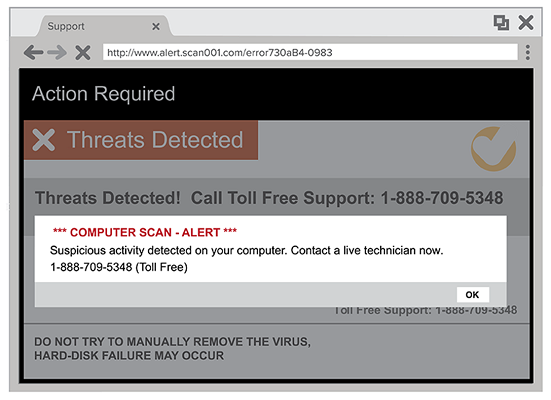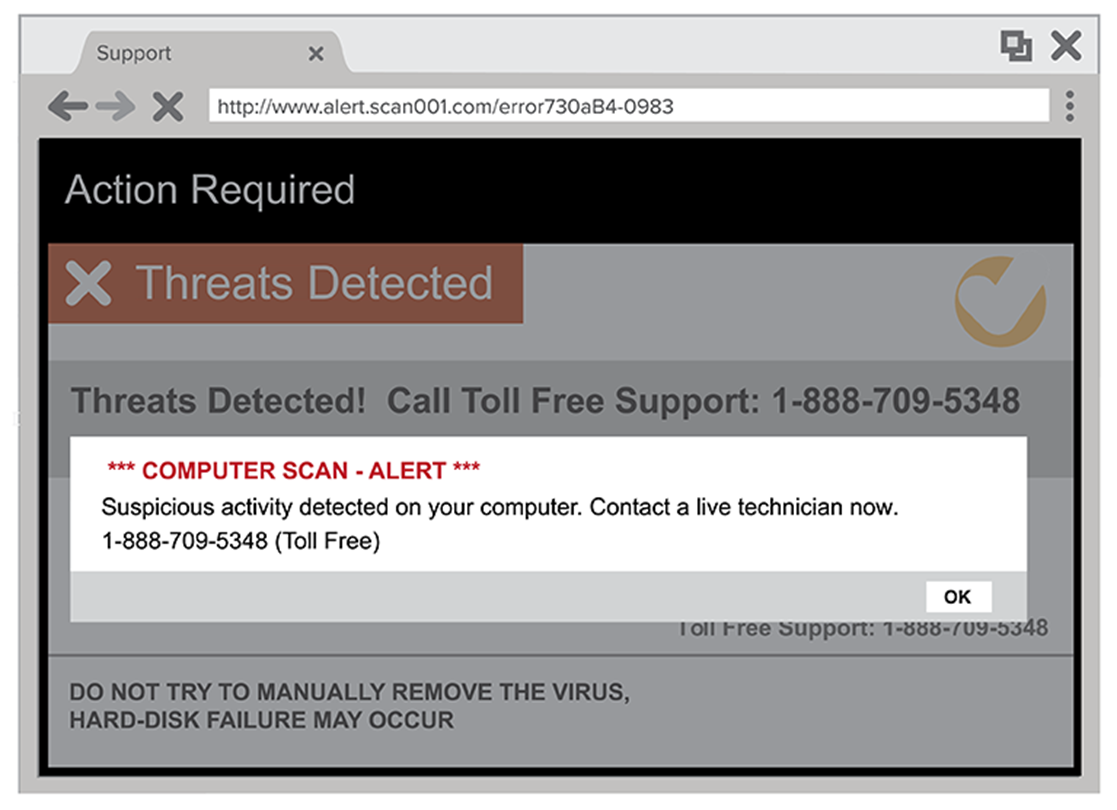Tech Support Scams

Local individuals like you and me are having this happen. If you allow your computer to be taken over, there is a real risk they can get to your assets and clean out bank accounts. Immediately shut down your computer and have it professionally scanned. If there has been a possibility of Identity theft, contact your bank for help on what you can do to protect not only your accounts, but your identity. Read here on more advice and what you can do to help stop scammers.
How to Spot, Avoid, and Report Tech Support Scams
Tech support scammers want you to believe you have a serious problem with your computer, like a virus. They want you to pay for tech support services you don't need, to fix a problem that doesn’t exist. They often ask you to pay by wiring money, putting money on a gift card, prepaid card or cash reload card, or using a money transfer app because they know those types of payments can be hard to reverse.
Spotting and Avoiding Tech Support Scams
Tech support scammers use many different tactics to trick people. Spotting these tactics will help you avoid falling for the scam.
Phone calls
Tech support scammers may call and pretend to be a computer technician from a well-known company. They say they’ve found a problem with your computer. They often ask you to give them remote access to your computer and then pretend to run a diagnostic test. Then they try to make you pay to fix a problem that doesn’t exist. Listen to an FTC undercover call with a tech support scammer.
If you get a phone call you didn’t expect from someone who says there’s a problem with your computer, hang up.
Pop-up warnings
Tech support scammers may try to lure you with a pop-up window that appears on your computer screen. It might look like an error message from your operating system or antivirus software, and it might use logos from trusted companies or websites. The message in the window warns of a security issue on your computer and tells you to call a phone number to get help.

If you get this kind of pop-up window on your computer, don’t call the number. Real security warnings and messages will never ask you to call a phone number.
Online ads and listings in search results pages
Tech support scammers try to get their websites to show up in online search results for tech support. Or they might run their own ads online. The scammers are hoping you’ll call the phone number to get help.
If you’re looking for tech support, go to a company you know and trust.
2 Things To Know To Avoid a Tech Support Scam
- Legitimate tech companies won’t contact you by phone, email or text message to tell you there’s a problem with your computer.
- Security pop-up warnings from real tech companies will never ask you to call a phone number.
What To Do if You Think There’s a Problem With Your Computer
If you think there may be a problem with your computer, update your computer’s security software and run a scan.
If you need help fixing a problem, go to someone you know and trust. Many software companies offer support online or by phone. Stores that sell computer equipment also offer technical support in person.
What To Do if You Were Scammed
If you paid a tech support scammer with a credit or debit card, you may be able to stop the transaction. Contact your credit card company or bank right away. Tell them what happened and ask if they can reverse the charges.
If you paid a tech support scammer with a gift card, contact the company that issued the card right away. Tell them you paid a scammer with the gift card and ask if they can refund your money.
If you gave a scammer remote access to your computer, update your computer’s security software. Then run a scan and delete anything it identifies as a problem.
If you gave your user name and password to a tech support scammer, change your password right away. If you use the same password for other accounts or sites, change it there, too. Create a new password that is strong.
Avoid Tech Support Refund Scams
If someone calls to offer you a refund for tech support services you paid for, it’s likely a fake refund scam. How does the scam work? The caller will ask if you were happy with the services you got. If you say, “No,” they’ll offer you a refund. In another variation, the caller says the company is giving out refunds because it’s going out of business. No matter their story, they’re not giving refunds. They’re trying to steal more of your money. Don’t give them your bank account, credit card or other payment information.
Reporting Tech Support Scams
If a tech support scammer contacts you, report it to the Federal Trade Commission at ReportFraud.ftc.gov.
When you report a scam, the FTC can use the information to build cases against scammers. Are you skeptical that reporting scams will make a difference? Watch this video to learn how your story could help the FTC stop scammers.
Now that you know how to recognize a tech support scam, share what you learned with someone you know. You might help them avoid a tech support scam.
For a copy of this list, download here: 5 How To Spot Avoid and Report Tech Support Scams